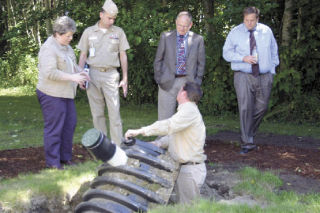Islanders must check their systems soon
Whidbey Islanders can learn to comply with a new law at what could be called Island County Septic Tank University.
For the past year, county employees have been busy implementing a new regimen for residents to have their septic systems regularly inspected, as is now required by law.
Inspection guidelines have been developed and providers trained and licensed. Now the county is implementing an education system that will allow homeowners to inspect their own systems.
New regulations that came into effect in July 2007 require homes with traditional gravity systems to be inspected once every three years and alternative systems to be inspected every year. County officials adopted an 18-month implementation period before inspections would begin, and that’s only a few months away.
A homeowner could have to pay several hundred dollars to have their system professionally inspected.
Chris Wilson, assistant planning director for Island County, said the educational part of the inspections is designed to empower and educate the homeowner. The program will help them make sure their system isn’t leaking human waste and impacting public health or the surrounding environment.
“We want a high level of maintenance,” Wilson said.
Malfunctioning septic systems are blamed in part for pollution in Puget Sound as everything in Island County runs downhill toward that threatened body of water.
The county has developed curriculum, a DVD and a septic classroom to help educate interested homeowners. The program is called Homeowner Septic Training.
The Island County Board of Health, which consists of the three elected commissioners, took a look July 21 at the new outdoor classroom located at the county shop on Patmore Road near Rhododendron Park.
Wilson said there is widespread interest in the program from people who want to help protect the environment while saving money by inspecting their own systems.
There will be a two-pronged approach to educate homeowners. The first part will be lessons people can learn in their homes through a DVD and a written curriculum. Once they have absorbed that body of knowledge, they will attend the indoor and outdoor classroom portion of the curriculum, where they will learn about the various parts of the septic system and how to monitor them.
Wilson said many homeowners will find it challenging to participate in the program. They need to find out if they have the right system and they need to learn its exact location and how to access the system.
He added that many people may choose to hire a professional to inspect the system for the first time and retrofit it for easier future inspections.
It will cost a homeowner an estimated $100 to $300 to have their septic system professionally inspected. The cost difference will depend on the type of system and how accessible it is to the inspector, said Jim Exe, onsite program manager for the Island County Health Department.
The county has spent the past year trying to implement a new system to meet the state inspection requirements.
Exe said there wasn’t any support available to do the work when the regulations came into effect.
“There were very few service providers who could conduct inspections,” Exe said. Since the regulations went into effect, county staff have been busy putting pieces into place. They have been developing criteria, and they have been training and licensing private contractors to conduct the inspections.
Currently, 45 individuals have passed the test on onsite septic inspections and 26 of those people have received their licenses. Nineteen businesses have licenses to conduct inspections and they are based on Whidbey Island, Camano Island and in Arlington.
The first septic system class for homeowners will take place next month. Wilson said the initial effort will target homeowners living in the Holmes Harbor area, because that is the location of a shellfish protection district. Shellfish and swimming are banned in the county park at Holmes Harbor due to pollution.
Wilson said the county is prioritizing the class to populations living close to sensitive areas, who could benefit from attending such classes.
Even though there are people who may not be eligible to use a home inspection to meet the new requirement, it still a good class for all homeowners with septic systems.
For more information about septic inspections, contact www.islandcounty.net/planning/index.htm and click on Homeowner Septic Training.



